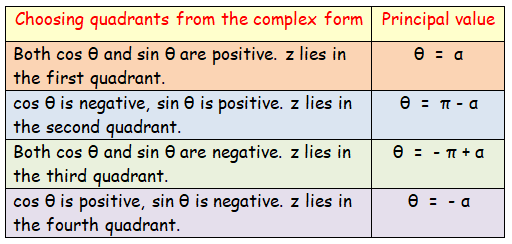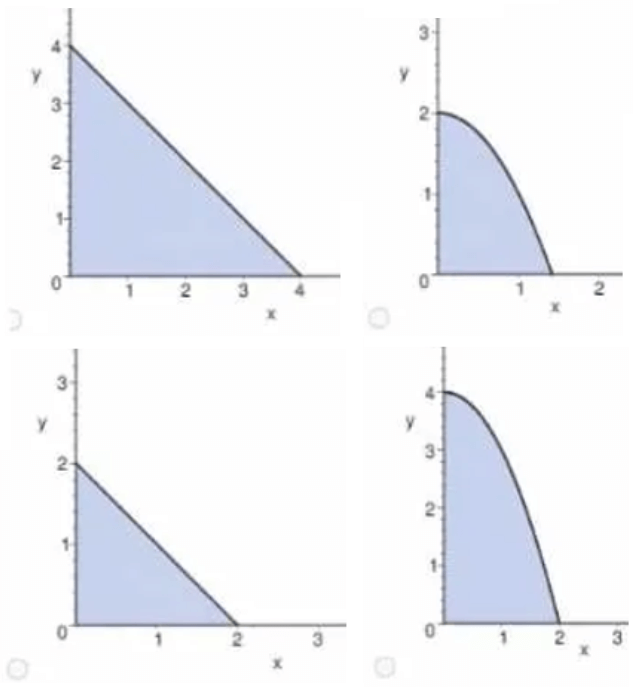WRITE THE COMPLEX NUMBER IN POLAR FORM
Polar form or trigonometric form :
The complex number a + bi is written in polar form as,
z = r(cos θ + i sin θ)
(where a = r cos θ, and b = r sin θ)
The value of r is called the modulus of a complex number z. i.e, r = |z|
To find the r, we use the formula r = √(a2 + b2).
The angle θ is called the argument of the complex number z. i.e, θ = arg(z).
To find the arg(z), we will use α = tan-1|b/a|.
To find the principal value θ of a complex number, we may use the following methods.

Find the trigonometric form of the complex number where the argument satisfies 0 ≤ θ < 2π :
Example 1 :
3i
Solution :
Given, z = 0 + 3i
The polar form of the complex number z is
r(cos θ + i sin θ)
0 + 3i = r(cos θ + i sin θ) -----(1)
|
Finding the r : r = |z| r = |0 + 3i| = √(3)2 r = 3 |
Finding the α : α = tan-1|b/a| α = tan-1(3/0) α = tan-1(∞) α = π/2 |
Since the complex number 0 + 3i is positive, z lies in the first quadrant.
So, the principal value θ = π/2
By applying the value of r and θ in equation (1), we get
0 + 3i = 3(cos π/2 + i sin π/2)
So, the polar form of z is 3(cos π/2 + i sin π/2)
Example 2 :
-2i
Solution :
Given, z = 0 - 2i
0 - 2i = r(cos θ + i sin θ) -----(1)
|
Finding the r : r = |z| r = |0 - 2i| = √(-2)2 r = 2 |
Finding the α : α = tan-1|b/a| α = tan-1(2/0) α = tan-1(∞) α = π/2 |
Since the complex number 0 - 2i is positive and negative, z lies in the fourth quadrant.
So, the principal value θ = - π/2
By applying the value of r and θ in equation (1), we get
0 – 2i = 2(cos (-π/2) + i sin (-π/2))
So, the polar form of z is 2(cos (-π/2) + i sin (-π/2))
Example 3 :
2 + 2i
Solution :
Given, z = 2 + 2i
2 + 2i = r(cos θ + i sin θ) -----(1)
|
Finding the r : r = |2 + 2i| = √[(2)2 + (2)2] r = √(4 + 4) r = √8 r = 2√2 |
Finding the α : α = tan-1|b/a| α = tan-1(2/2) α = tan-1(1) α = π/4 |
Since the complex number 2 + 2i is positive, z lies in the first quadrant.
So, the principal value θ = π/4
By applying the value of r and θ in equation (1), we get
2 + 2i = 2√2(cos π/4 + i sin π/4)
So, the polar form of the complex number z is
2√2(cos π/4 + i sin π/4)
Example 4 :
√3 + i
Solution :
Given, z = √3 + i
√3 + i = r(cos θ + i sin θ) -----(1)
|
Finding the r : r = |√3 + i| = √[(√3)2 + (1)2] r = √4 r = 2 |
Finding the α : α = tan-1|b/a| α = tan-1(1/√3) α = π/6 |
Since the complex number √3 + i has a positive, z lies in the first quadrant.
So, the principal value θ = π/6
By applying the value of r and θ in equation (1), we get
√3 + i = 2(cos π/6 + i sin π/6)
So, the polar form of z is 2(cos π/6 + i sin π/6)
Example 5 :
-2 + 2i√3
Solution :
Given, z = -2 + 2i√3
-2 + 2i√3 = r(cos θ + i sin θ) -----(1)
|
Finding the r : r = |-2 + i√3| = √[(-2)2 + (2√3)2] r = √16 r = 4 |
Finding the α : α = tan-1|b/a| α = tan-1(2√3/2) α = tan-1(√3) α = π/3 |
Since the complex number -2 + 2i√3 is negative and positive, z lies in the second quadrant.
So, the principal value θ = π - π/3
θ = 2π/3
By applying the value of r and θ in equation (1), we get
-2 + 2i√3 = 4(cos 2π/3 + i sin 2π/3)
So, the polar form of z is 4(cos 2π/3 + i sin 2π/3)
Example 6 :
3 - 3i
Solution :
Given, z = 3 - 3i
3 – 3i = r(cos θ + i sin θ) -----(1)
|
Finding the r : r = |3 - 3i| = √[(3)2 + (-3)2] r = √18 r = 3√2 |
Finding the α : α = tan-1|b/a| α = tan-1(3/3) α = tan-1(1) α = π/4 |
Since the complex number 3 -
3i has a positive and negative, z lies in the fourth quadrant.
So, the principal value θ = – π/4
By applying the value of r and θ in equation (1), we get
3 - 3i = 4(cos (-π/4) + i sin (-π/4))
So, the polar form of z is 4(cos (-π/4) + i sin (-π/4))
Example 6 :
-2√3 - 2i
Solution :
Given, z = -2√3 - 2i
-2√3 - 2i = r(cos θ + i sin θ) -----(1)
|
Finding the r : r = |-2√3 - 2i| = √[(-2√3)2 + (-2)2] r = √(12 + 4) r = √16 = 4 |
Finding the α : α = tan-1|b/a| α = tan-1(-2/(-2√3)) α = tan-1(1/√3) α = π/6 |
Since the complex number -2√3 - 2i has a negative and negative, z lies in the third quadrant.
So, the principal value θ = π - α
θ = π - π/4
θ = (4π - π)/4
= 3π/4
By applying the value of r and θ in equation (1), we get
-2√3 - 2i = 4(cos 3π/4 + i sin 3π/4)
So, the polar form of z is 4(cos 3π/4 + i sin 3π/4).
Related pages
Kindly mail your feedback to v4formath@gmail.com
We always appreciate your feedback.
©All rights reserved. onlinemath4all.com
Recent Articles
-
AP Calculus AB Problems with Solutions (Part - 10)
Feb 06, 25 09:46 AM
AP Calculus AB Problems with Solutions (Part - 10) -
AP Calculus AB Problems with Solutions (Part - 8)
Feb 05, 25 12:22 PM
AP Calculus AB Problems with Solutions (Part - 8) -
AP Calculus AB Problems with Solutions (Part - 9)
Feb 05, 25 12:15 PM
AP Calculus AB Problems with Solutions (Part - 9)
